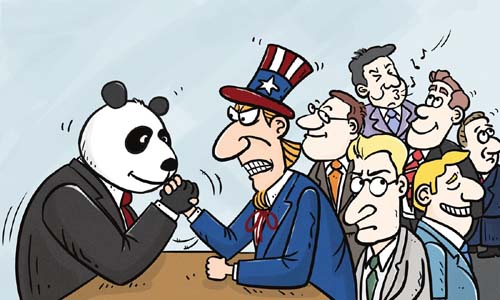
G7’s imperialist plan can’t defeat BRI
Ding Gang
The G7 summit announced that it will start a “Build Back Better World” global infrastructure plan, aiming to help developing countries and counter the China-proposed Belt and Road Initiative (BRI).
The G7 countries were all, historically, colonists. The very difference with China over the path of development is: They initially accumulated their capital by colonial plundering and wars.
China did not repeat the old path of Western developed countries, as some Westerners have predicted. Quite the contrary, China via the BRI is helping other developing countries without any political conditions.
If these seven countries really desire to follow China’s suit and sincerely invest in countries from whom they robbed fortunes from, this shows that they are at least making critical reflections about their courses of action.
There are doubts though, mainly because the Americans are seemingly trying to use the guise of infrastructure to confront and contain China.
Regardless of whether or not they are motivated to counter China’s BRI, the Americans and their ilk are eager to hatch such a plan. This proves that China’s model of self-dependence is way ahead of these colonists. It also demonstrates that the China-proposed BRI can push the world forward.
We do not know yet how much money each of these G7 members is willing to pay. What kinds of projects they will support? How much will the US payout, and to what degree will it deepen its indulgences for “America First?”
Also, which companies will take responsibility to complete the projects? What values-based standards will be adopted to judge each project? Will the projects have their pre-set political conditions?
Will Western companies obtain, implement and hand over their projects according to their own moral and environment standards? Will they engage in bribery and other illegal acts?
It is time the world tests Western values. Last month, in a bid for Ethiopia’s telecommunications licenses, South African company MTN lost because it teamed up with the Silk Road Fund, China’s state-owned investment fund. A US-backed and Vodafone-led consortium won the bid at a price of $850 million, with billions of dollars of support from US government-affiliated agencies. This was done on the condition that it does not use China-made telecommunication equipment and facilities.
This easily leads us to think about how the Western powers were at war with each other to grab the land of Asia, Africa and Latin America. The so-called new plan of Washington is just a revamped version of the same old colonial story.
The move may constrain the global development of China’s 5G technology, but it cannot stop the expansion of the BRI. After all, countries along the route need it, and China has the ability to expand it.
Take Ethiopia for example. According to statistics from the Ethiopian Investment Commission, Chinese companies implemented about 1,564 investment projects between 1998 and 2020 which are either operating or under construction.
The Addis Ababa-Djibouti Railway, which is the first electrified railway of its kind in East Africa, was built with Chinese standards and facilities. It is because of China’s BRI that Ethiopia has established the foundation for the development of advanced communications.
The competition between G7 members and China will enable some developing countries to have more choices and more development support. But if the Americans insist to bring in their political motives and force these countries to take sides, they will inevitably set them into an embarrassing state.
If Washington does this, it is not promoting the world’s peaceful development, but is instead creating obstacles for this process.
After all, Western countries do not have enough economic strength to sustain their “political assistance.” Nor can they force developing countries to buy their goods and have them cease using Chinese technologies.
Incorporating all developing countries into a US-led world economic system is an unachievable illusion.
The writer is a senior editor with People’s Daily, and currently a senior fellow with the Chongyang Institute for Financial Studies at Renmin University of China.
